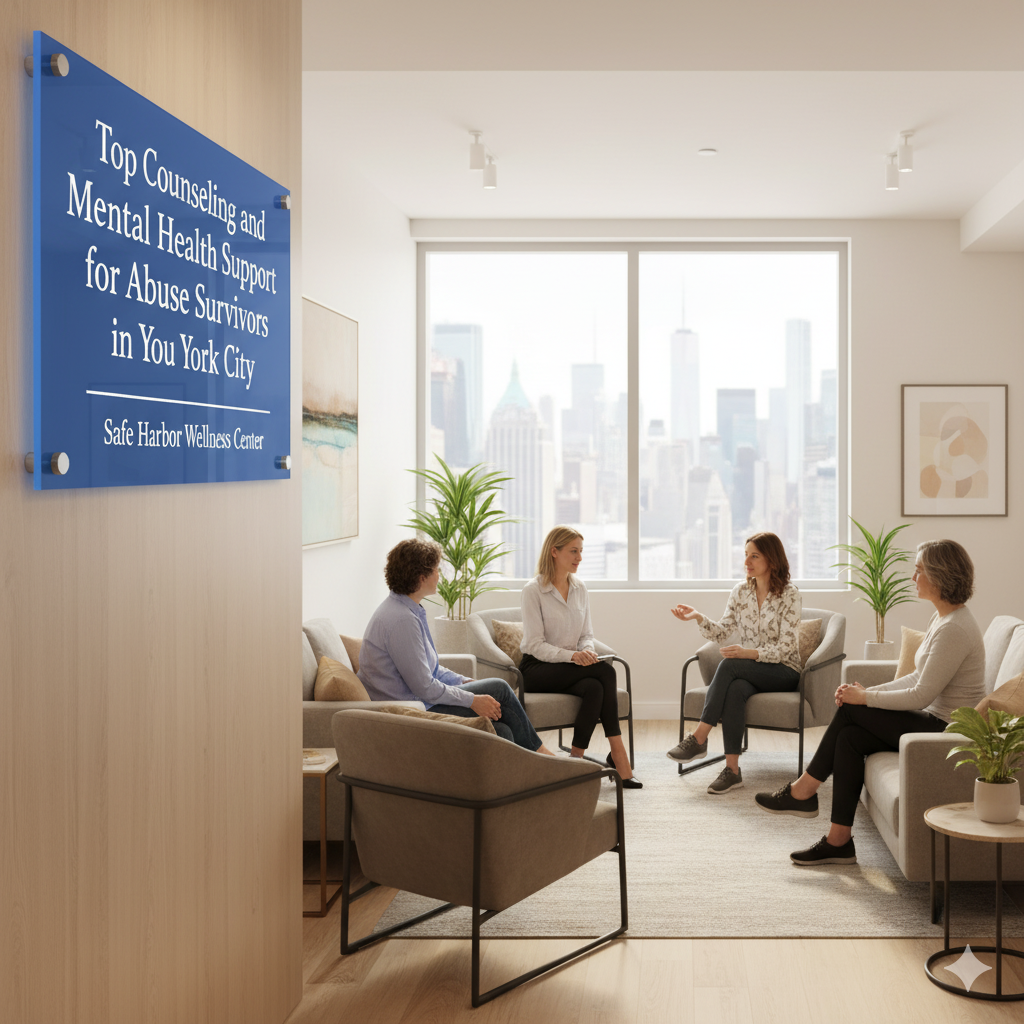Top Counseling and Mental Health Support for Abuse Survivors in New York City
Comprehensive 2025 list of top mental health and counseling programs for domestic violence and abuse survivors in New York City — with free and low-cost therapy options in Manhattan, Brooklyn, Queens, Bronx, and Staten Island.

🧠 Top Counseling & Mental Health Support for Abuse Survivors in New York City (2025)
Introduction
Survivors of abuse—whether domestic violence, sexual assault, stalking, or trafficking—often carry deep emotional wounds. Having access to trauma-informed counseling, peer support, and mental health services can be transformative on the path to healing. Below is a curated list of trusted organizations, hotlines, and programs in New York City (2025) that specialize in working with survivors of abuse.
Key Principles for Survivor Counseling
When evaluating mental health support, survivors should look for:
Trauma-informed care (understand how abuse impacts people mentally, physically, emotionally)
Confidentiality & safety (services must protect your privacy and safety)
No or sliding-scale fees (so cost doesn’t block access)
Cultural and language competence (providers with experience in communities with specific cultural, immigration, or language needs)
Integrated services (counseling combined with legal, housing, health, or social services)
NY State’s Office for the Prevention of Domestic Violence lists that many DV/sexual violence providers offer counseling, support, and referrals. (Domestic Violence Prevention Office)
NYC Health + Hospitals also provides domestic violence services including psychologists, psychiatrists, social workers to help survivors with mental health symptoms. (NYC Health + Hospitals)
Top Counseling & Support Organizations in NYC
Below are leading organizations dedicated to supporting survivors of abuse in New York City:
1. Safe Horizon Counseling Center / NYC Victim Services
Offers individual counseling, supportive therapy, crisis intervention for victims of crime including domestic violence. (New York City Government)
Accepts Medicaid, Child Health Plus, many private insurances, and provides sliding scale for those uninsured. (New York City Government)
Contact: 1-866-689-HELP (4357) or through NYC Victim Services. (New York City Government)
2. NYC Family Justice Centers (FJCs)
Each borough has a Family Justice Center where survivors can access counseling, legal, social services, safety planning all in one place. (New York City Government)
Services are free, multilingual, and available regardless of immigration status. (STH Resource Guide)
3. Womankind (formerly NY Asian Women’s Centre)
Provides trauma counseling, support groups, and culturally competent services especially for Asian and immigrant survivors. (WOMANKIND)
Offers multilingual services (18+ languages/dialects). (WOMANKIND)
4. Sanctuary for Families
Offers therapy and counseling as part of its holistic services for survivors of domestic violence, sex trafficking, and related gender violence. (Sanctuary For Families)
Legal, housing, economic support are integrated with mental health support. (Sanctuary For Families)
5. NYC Health + Hospitals Victim Services / Domestic Violence Program
At Bellevue Hospital and other NYC Health + Hospitals sites, the Victim Services Program supports survivors of violent crime with mental health resources and advocacy. (NYC Health + Hospitals)
Domestic violence mental health support is available through NYC Health + Hospitals facilities. (NYC Health + Hospitals)
6. Urban Resource Institute (URI)
Although primarily known for shelters, URI also provides therapy and support services to survivors of domestic violence combined with safe housing. (Wikipedia)
7. National Alliance on Mental Illness (NAMI) NYC Metro
Offers peer-led support groups, which can be helpful for survivors dealing with mental health aftermath of abuse. (NAMI NYC)
Support Groups & Peer Networks
Sometimes connecting with others who’ve experienced similar trauma is deeply healing. Some group resources:
Trauma-Focused Support Groups (virtual + NYC-based) on platforms like Psychology Today. (Psychology Today)
NAMI NYC Metro runs free support groups (mental health / recovery community). (NAMI NYC)
Sexual Abuse Support & Survivor Groups listed in greater NYC region. (Psychology Today)
How to Choose the Right Counselor or Program
Factor | What to Ask / Check |
|---|---|
Trauma experience | Does the therapist or organization have experience with domestic violence, sexual abuse, PTSD? |
Cost & insurance | Do they accept your insurance? Do they offer sliding scale or free services? |
Safety & confidentiality | How do they protect your privacy? Can they provide remote or discreet sessions? |
Language & cultural competence | Can they meet you in your preferred language or understand your cultural context? |
Accessibility & location | Are they convenient by subway or public transport? Are remote/telehealth options available? |
Tips for Survivors Beginning Therapy
Be gentle with yourself — healing takes time
It’s okay to switch therapists if you don’t feel safe or understood
Ask upfront how they handle crisis situations (e.g. suicidal thoughts)
Consider combining therapy with support groups and community resources
Use emergency contacts and hotlines when distress overwhelms therapy sessions
